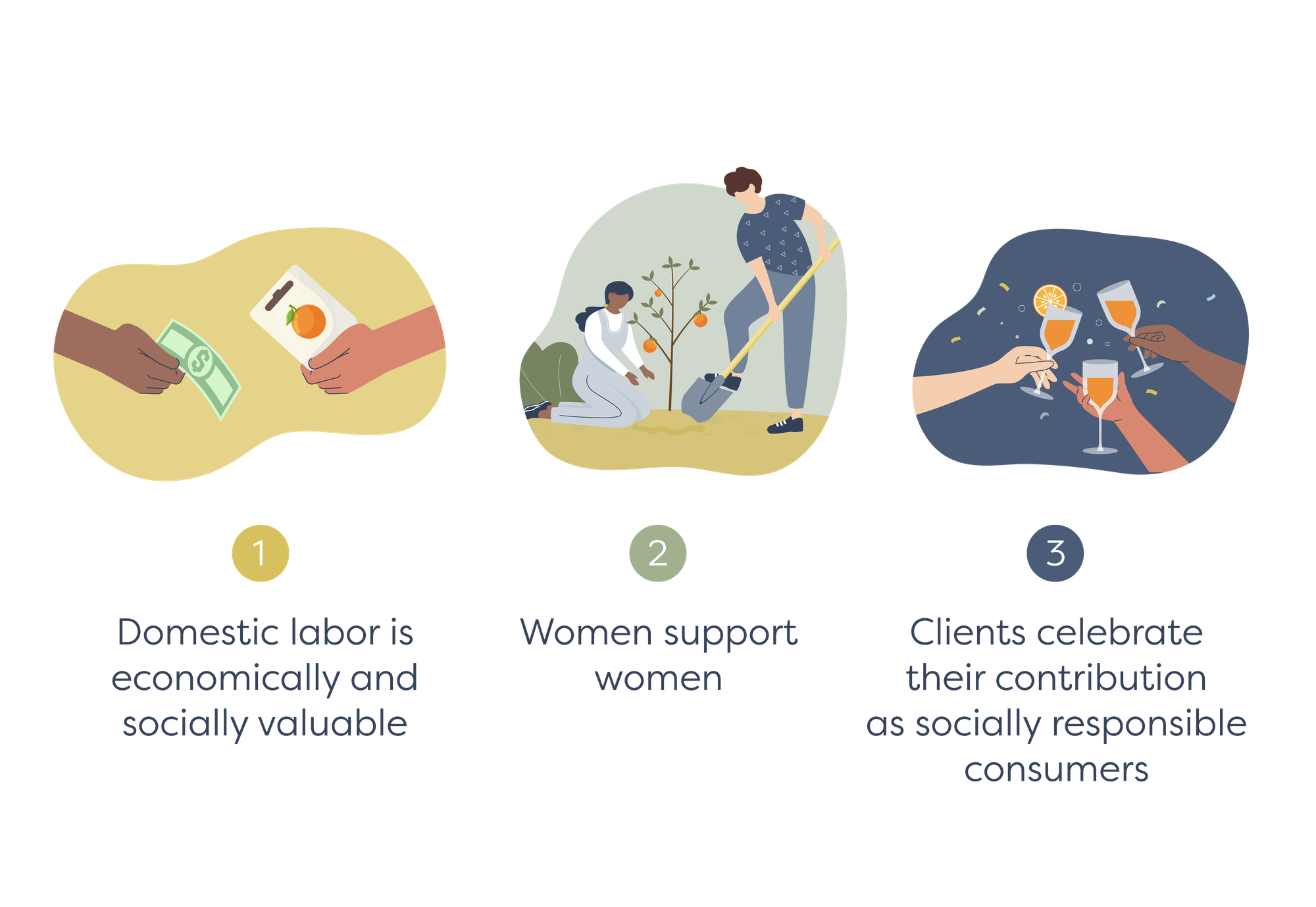Mop in hand, united we stand: A collective perspective on housework

Now is the time to revalue women’s work in the US economy through national networks of professional services.
Last year, I offered a deep dive into the business of home organizing, exploring the history of the industry, business opportunities, existing market dynamics, and the costs of operating a successful business. Today, I want to focus on how the work historically done in homes by women has the potential to matter more now than ever before if we can approach domestic labor as a system or a collective that is foundational to our economy rather than as an individualistic activity.

Client perspective
Today, families recognize that they cannot “have it all” and certainly cannot “do it all.” Many are looking for more equitable ways to distribute household labor and unburden members of the family from the cognitive load that has been expected from women and mothers.
As an evolving society in the midst of the largest transfer of wealth to women in the history of humanity ($30 trillion!), we have untapped potential to use this moment not just as a transfer of money, but also as an assertion of a society built in partnership with women, for the benefit and advancement of communities. Let us take advantage of what Melinda Gates marked as a “moment of lift” and use this crossroads to lift more women and families in our communities.

Provider perspective
Whether it is house cleaning, laundry, or home organizing, most service providers have not yet found sustainable national service models, and our ways of working are overdue for an overhaul. In various ways, technology actors are exploring the tools and networks necessary to professionalize domestic labor for services, including house cleaning, meal prep, grocery shopping, clothing shopping, and home organizing. Many technology products are exploring opportunities to leverage the gig economy as services for hire.
Imagine if, rather than engaging with this labor squeeze to drop the prices and value of this critical work, we committed as a society to a larger social change. Domestic labor could be not only financially recognized in the GDP and formal economy, but also integrated into a collective business model that promotes fair compensation, teamwork, and the sharing of resources.

Home organizing is an example of new home services positioned to meet an increased demand for services.
Household management has the potential to become a $339 billion market opportunity. The total addressable market (TAM) of home organizing alone is estimated to be at least a $14 billion market opportunity if you consider helping just a fraction of families get organized or move into a new home. In 2022, we surveyed the industry and estimated that a minimum of $400 million is spent annually, with over 5,000 home organizers operating across the United States. We are seeing research from Pivotal Ventures and McKinsey consulting, funded by the Melinda French Gates Foundation, come to fruition as we watch more and more families who are on the “cusp of care” decide that they want to pay for services and hire home support rather than depending on old models of “women’s work” that historically did household work for free or market depressed wages.
Imagine the domestic labor industry fueled by women championing women in homes and at the office.
Now is the moment for domestic service as an industry to catalyze a movement for higher wages and better jobs. Technology is changing at a rapid pace and the future of work is fluid. We need a movement among women and families to affirm:

1- Domestic labor is economically and socially valuable
What if we could remove the cultural norms and create a cadre of livable-wage home services that are good for everyone in the value chain?
Domestic labor is a skilled manual profession deserving of fair compensation, benefits, and respect.
2- Women+ support women+
Can you imagine an inclusive economy where diversity is celebrated with the expectation that women show up as professionals and work well together?
We collaborate rather than compete and win together when we share resources.
3- Clients celebrate their contribution as socially responsible consumers
What if organizing your home created a ripple effect in support of your community?
Families support and hire home services as an act of social responsibility. They benefit from more time and equitable distribution of household labor and they are excited to support local economies that strengthen their community and uplift families in their town.
Domestic workers operating in community with each other have so much to gain by working together.
Home organizing is a glamorous-looking, Instagram-ready business, but behind the scenes it is full of grit and hustle. Most organizers making a great income have done so by leveraging their star power in the form of additional entertainment content, product deals, or supplemental how-to courses for other organizers. And unfortunately, with this model, there’s only enough room for a few people to make money, because it isn’t built on the strengths of an industry—each business is built on an entrepreneur's star power and know-how.
Working together, domestic labor professionals could create financial health for everyone within the system. Individual providers don’t easily scale, as we learned with home organizing, but collective services can be designed so that everyone in the system has access to higher wages and long-term wealth.
As an example, I hope that one day, home organizers collectively shift and explore home organizing as a collective work done by teams rather than individuals. Organizers have a special skill to see systems and optimize function within homes. Working as a network rather than as single businesses, they could bring that same organizational lens to the business of organizing and build new financial systems to create and extend benefits to themselves and their teams. By sharing backend tooling resources such as CRM tools, website management, marketing, legal, inventory management, and accounting, owners can redistribute the remaining funds, including ensuring that teams have competitive employment income and emergency savings or retirement accounts.
By embracing a collective-industry mentality, I challenge every home organizer to imagine what the industry of home organization would look like if we solved for collective good rather than at the individual level—and I challenge professionals in other industries to do the same. How might everyone win if we applied our system thinking to closing gender gaps?
For home organizers, the benefits to this national network would include synergies such as the ability to help families move across state lines, transitioning elders in our community to more manageable housing, or supporting companies who want to relocate executives. Not to mention negotiation power for products and inventory warehouses.

Approaching domestic labor as a system creates opportunities to solve problems at scale.
For far too long we have treated work that happens within homes as a private and individual concern to be solved by individuals. Work within homes benefits entire communities and can lift our economic gross domestic product, if it were valued and counted in our economy. To achieve greater equity for work performed in the home, we have so many ways to impact this economy. Households value and compensate for home services, workers organize and unite, companies and large organizations contribute, government entities create tax incentives and compensation, to name just a few.
Startup founder Jason Cohen writes about the challenges of scaling consulting businesses and I found it on point with other service businesses. He notes there are advantages to providers who can leverage their knowledge and make technology products to improve the overall business outcomes but shares all the difficult hurdles that make scaling so incredibly difficult. Moving from a solo entrepreneur to a networked entrepreneur may require a larger movement within communities because the work to grow and scale alone is so challenging.
That said, the inequalities of domestic labor are too complex for individual households and providers to solve alone. The time to make systemic changes regarding our economic value for domestic labor is now. Just like Cinderella thought she could go to the dance “if she completed all her chores” only to discover the work could never be done, we need to drop the collective “Cinderella Bargain” that women can have a thriving career and family, “if we can keep up with our second-shift at home.” National collectives of professional domestic laborers (including home organizers) supported by households that need and value domestic care offer a viable option to increase wages and create better work conditions.
